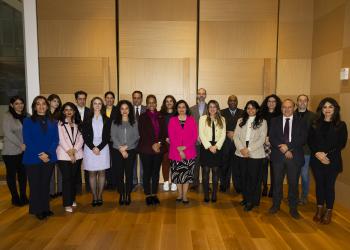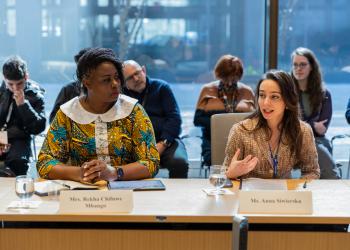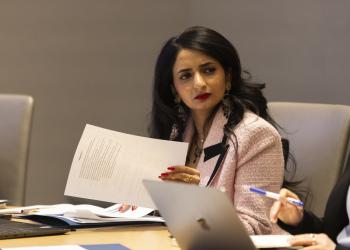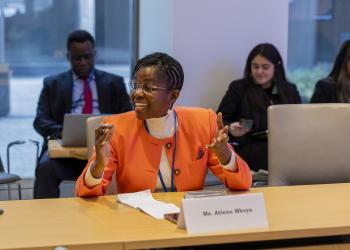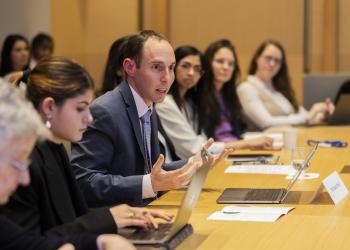BIC Explores the Role of Social Institutions in Gender Equality at Commission on the Status of Women
“Societies characterized by robust patterns of gender equality will become possible only as institutions…are increasingly recast according to principles of equality and justice, and the members within them strive to apply such principles in their work and service.”
Such a focus on the role of social institutions in advancing gender equality was at the heart of the Baha’i International Community’s (BIC) statement (English, Arabic) and overall engagement with the 68th session of the United Nations’ annual Commission on the Status of Women (CSW), which concludes on Friday 22 March.
Over two dozen delegates from around the world joined New York staff on the BIC’s delegation, including BIC representatives from its UN Office in Geneva and its regional Offices in Ethiopia and Cairo; representatives of national Baha’i communities in Australia, Bahrain, Canada, Oman, Tunisia, the United Arab Emirates, and the United States; as well as additional delegates and collaborators from Brazil, Germany, and the United Kingdom.
“The equality of women and men is a universal principle that must be applied to the institutional structures of countless communities around the world. This will require a global process of learning, and we are pleased that our delegation is able to draw from a wide diversity of local, national and regional efforts to advance the cause of gender equality” said BIC Representative Liliane Nkunzimana, who headed the delegation.
BIC delegates organized a range of events associated with the Commission. A gathering hosted in collaboration with the Kenyan government’s Office of the President's Advisor on Women's Rights focused on strengthening institutions to advance women's rights in Africa (see recording, news story, highlights). Another highlighted the Our Story is One campaign and the power of individual and community-level action to effect change (recording, highlights). Themes from the BIC’s statement to the Commission, “Reimagining the Role of Institutions in Building Gender-Equal Societies,” were explored in yet another event, with speakers from the Zambian and Polish UN Mission delegations (recording, highlights).
BIC delegates also organized events addressing regional issues and concerns. Delegates from the Arab region, for example, conducted an event in Arabic on the empowerment of women through institutional action (news story, highlights). A panel discussion organized by delegates from Australia and Canada explored the process of moving from conflict to collaboration within institutions (recording, highlights).
Speaking at the event organized by the Australian and Canadian delegates, Andrea Salguero, a representative of the Baha’i community of Canada, said in welcoming remarks that “Institutions are more than the sum of their parts. They are more than just the aggregate of the individuals that work within them. We can see institutions as a reflection of our culture and the values that create them and sustain them.”
BIC delegates were also featured in a number of events organized and hosted by other organizations. Dr. Atieno Mboya, from the BIC regional Office in Addis Ababa, Ethiopia, joined the UK CSW Association for a panel dialogue exploring definitions of poverty, wealth, and current economic norms. BIC Representative Daniel Perell was invited to address the NGO CSW civil society briefing on the upcoming Summit of the Future. Delegate Mohamed Ben Moussa, representative of the Baha'i community of Tunisia, participated in a discussion on institutional relationships for humanity's evolution.
Notable among many themes highlighted across the Commission was the role to be played by youth. BIC Representative Cecilia Schirmeister spoke at the Youth Voices event at the United Kingdom Mission to the UN, exploring the intersection between youth and gender equality. BIC delegates participated in the CSW Youth Forum, designed to create an engaging space for adolescent girls and young people. Delegates also took part in the Commission’s civil society townhall with the Secretary-General of the United Nations.
The BIC co-hosted an event with WorldWIDE Network Nigeria during the Commission. Participants held fruitful discussions on the role that women, men and institutions play in securing equal land rights for women, especially in filling the gap between the creation and implementation of land inheritance law (highlights).
Lastly, the BIC hosted a reception that drew some 85 attendees from a range of geographic backgrounds and institutional affiliations.
Across the Commission, BIC delegates strove to place incremental steps for progress and institutional reforms within the wider context of translating the principle of gender equality into entirely new social arrangements, more appropriate for all members of society.
